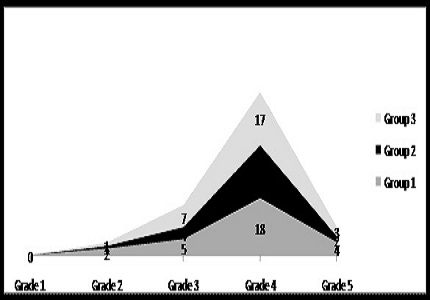Study of appropriate timing and short term effectiveness of measles vaccination
Abstract
Introduction: Measles remains the leading cause of vaccine preventable childhood mortality and morbidity in developing countries. Measles vaccine contributes to the reduction of childhood mortality. The optimal age of vaccination has to be individualised for each country.
Materials and Methods: The study was done for a period of two months in a government hospital Davangere. A total of 84 children were studied in three groups. Group 1 comprised of 29 children, of 9 months (± 10 days) of age, not vaccinated against measles. Group 2 of 28 children of 18 months (± 15 days) of age, vaccinated against measles at 9 months of age. Group 3 of 27 children of 36 months (± 15 days) of age, vaccinated against measles (EZ strain) at nine months of age. Antibody titres more than 200mIU/ml, was considered seropositive and statistical analysis was done by ANOVA and Mann Whitney test, chi square test.
Results: In group 1, 13 (45%) of 29 children were seropositive, 55% were seronegative, and 8 (28%) had antibody level above 1000 m IU/ml. In group 2, 7(26%) were seronegative. In group 3, 5(18%) were seronegative. Antibody titres had significant statistical variation between groups 1 and 2, and groups 1 and 3. Sex, nutrition status and duration of exclusive breast feeding did not have any influence in the seropositivity in all the three age groups.
Conclusion: Measles vaccine should be administered before 9 months, as early as 6 months and second dose at 12-15 months of age.
Downloads
References
2. Sharma RS. An Epidemiological study of measles epidemic in District Bhilwara ,Rajasthan. J Corn Dis 1998; 20(4): 301-311
3. Sehgal S, Sharma RS, Das A. Seroconversion after measles vaccination in infants and children . J Com Dis 1983;15(2): 75-79
4. Satpathy SK, Chakraborty AK. Epidemiological study of measles in Singur, West Bengal. J Com Dis 1990:22: (1): 23-26.
5. Sood DK, Kumar S, Singh S, Sokhey J. Measles vaccination in India. Vaccine 1995;13(8);785-6.
6. Damien,B, Huiss S, Schneider F, Muller C.P. Estimated susceptibility to asymptomatic secondary immune response against measles in late convalescent and vaccinated persons. J. Med. Virol 1998;56:85-90.
7. Ariyasriwatana C, Kayanarooj S, Pattamadilok S. Antibody response after measles immunization. J Med Assoc Thai 2003;86(3):701-6.
8. Gans HA, Yasukawa LL, AldersonA, Rinki M, DeHovitz R, Beeler J, et al.Humoral and cell mediated immune responses to an early 2 dose measles vaccination regimen in the United States. J Infect Dis 2004;190(1):83-90.
9. Itoh M, Okuno Y, Hotta H. Comparitive analysis of titers of antibodies against measles virus in sera of vaccinated naturally infected individuals in different age groups. J Clin Microbiol.2002.40(5):1733-78.
10. Hegazy IS. Seroepidemiological study of measles. Practical implications for measles immunization. Saudi Arabia Health Science. J East Med Reg1999;7(2):62-70.
11. Poland GA, Jacobson RM. Failure to reach the goal of measles elimination. Apparent paradox of measles infection in immunized persons. Arch Intern Med 1994;154:1815-20.
12. Christenson B , Bottiger M. Measles antibody: Comparision of long term vaccination titres, early vasccination titres and naturally acquired immunity to and booster effects on the measles virus. Vaccine.1994 Feb;12(2):129-33.
13. Rawat D, Chakravarthy A, Yadav S. Study of measles antibodies in children. Indian Pediatr 2001;38(11) 1286-9.
14. Sood DK, Kumar S, Singh S, Sokhey J. Measles vaccination in India . Vaccine 1995;13(8);785-6.

Copyright (c) 2015 Author (s). Published by Siddharth Health Research and Social Welfare Society

This work is licensed under a Creative Commons Attribution 4.0 International License.


 OAI - Open Archives Initiative
OAI - Open Archives Initiative


